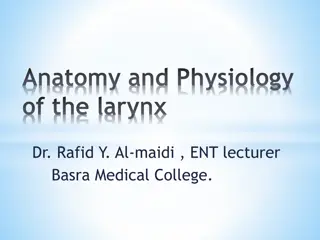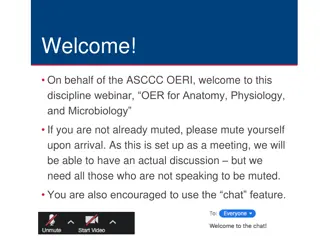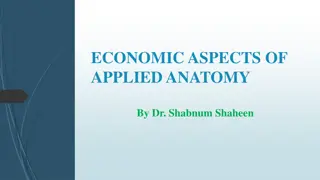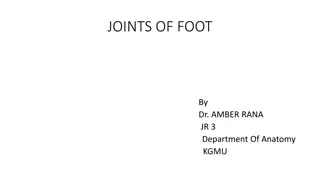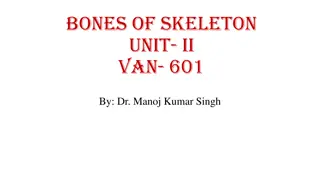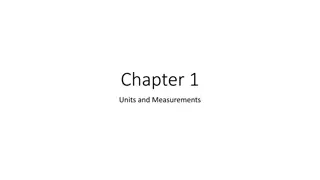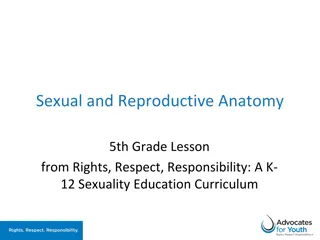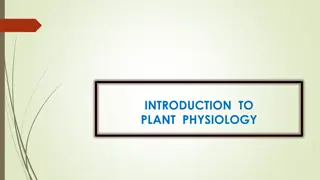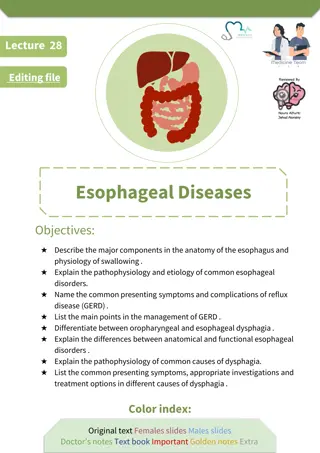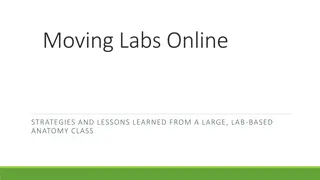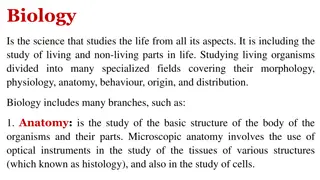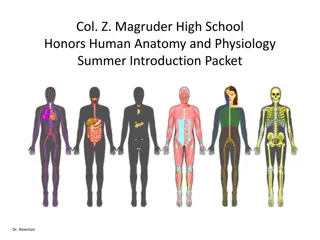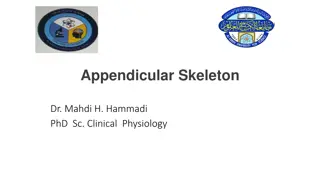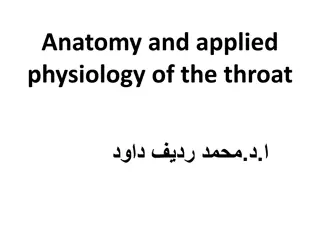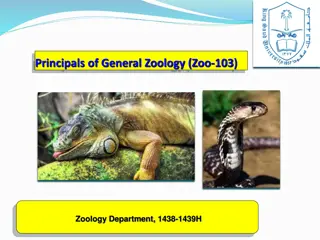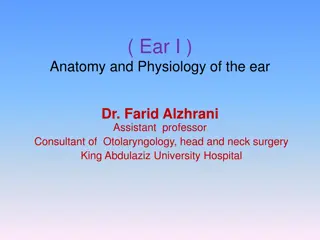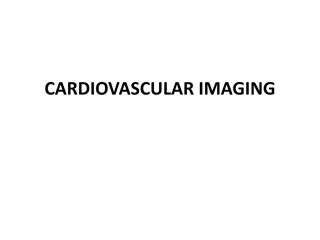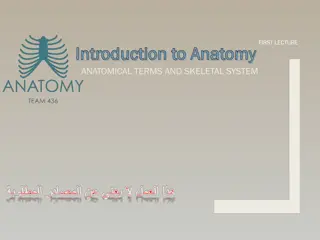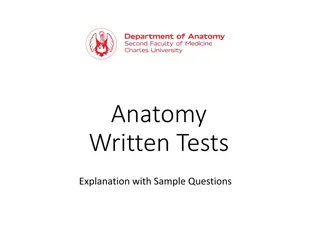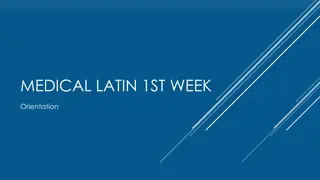Comprehensive Overview of Human Anatomy and Physiology Units in Medical Education
Delve into a structured curriculum covering cellular and tissue levels of organization, bone, skeletal, muscular, nervous, endocrine, cardiovascular, respiratory, digestive, urinary, and reproductive systems, along with discussions on human diseases and epidemiology. Explore the intricacies of various body systems, functions, and pathophysiology under the guidance of expert faculty members.
Download Presentation

Please find below an Image/Link to download the presentation.
The content on the website is provided AS IS for your information and personal use only. It may not be sold, licensed, or shared on other websites without obtaining consent from the author.If you encounter any issues during the download, it is possible that the publisher has removed the file from their server.
You are allowed to download the files provided on this website for personal or commercial use, subject to the condition that they are used lawfully. All files are the property of their respective owners.
The content on the website is provided AS IS for your information and personal use only. It may not be sold, licensed, or shared on other websites without obtaining consent from the author.
E N D
Presentation Transcript
Human Anatomy and Physiology UNIT TOPIC FACULTY Unit I Cellular and tissue level of organization Chemical and Cellular levels of organization, cell division, cellular diversity and cell ageing. Tissue level of organization, epithelial and connective tissues, muscular tissue, nervous tissue and tissue repair. LAKSHMI KESARI, PhD Unit II Bone, skeletal and muscular systems Overview of the skeletal and muscular systems, skeletal muscle tissue, contraction and relaxation of skeletal muscle fibers, muscle metabolism, cardiac muscle tissue, smooth muscle tissue regeneration of muscle tissue, ageing and muscle tissue, structure and functions of the bone, bone formation, fracture and repair of the bone, role of bone in calcium homeostasis; ageing and bone tissue LAKSHMI KESARI, PhD Unit III Nervous tissue Overview of the nervous system, histology of nervous tissue, electrical signals in neurons, signal transmission at synapses, neurotransmitters, neural circuits, central nervous system, brain organization, blood supply to brain and spinal cord, cerebrospinal fluid, somatic and autonomic nervous systems LAKSHMI KESARI, PhD Unit IV Endocrine system Overview of the endocrine system, endocrine glands, hormones and their function, mechanisms of hormone action, hormone-producing glands (hypothalamus, pituitary, pineal gland, thyroid, parathyroid, adrenals, pancreas, ovaries and testis). LAKSHMI KESARI, PhD
Human Anatomy and Physiology (Credit=3; 12h/credit) UNIT TOPIC FACULTY Blood, Cardiovascular and Lymphatic systems Overview of blood, cardiovascular and lymphatic systems, anatomy of the heart, blood circulation to heart, heart valves, cardiac muscle tissue and contraction, cardiac cycle, anatomy and function of blood vessels, capillary exchange, hemodynamics, regulation of blood pressure, circulatory routes, shock and homoeostasis, anatomy and function of lymphatic system, development of lymphatic tissues. Unit V LAKSHMI KESARI, PhD Respiratory system Overview of the respiratory system, anatomy of the respiratory system, pulmonary ventilation, exchange of oxygen and carbon dioxide, transport of oxygen and carbon dioxide, control of respiration Unit VI LAKSHMI KESARI, PhD Digestive and Gastro-intestinal systems Overview of the digestive system: peritoneum, mouth, pharynx, esophagus, stomach, pancreas, liver, gall bladder, small intestine and large intestine; and phases of digestion. Fluid compartments, electrolytes and acid-base homeostasis. Unit VII LAKSHMI KESARI, PhD Urinary system Overview of urinary system, structure and function of kidney, glomerular filtration, tubular reabsorption and secretion.. Unit VII LAKSHMI KESARI, PhD Reproductive system Overview of male and female reproductive systems, hormones, female reproductive cycle. Unit IX LAKSHMI KESARI, PhD
Human Diseases and Health Care Policy UNIT TOPIC FACULTY Unit I Epidemiology. Overview of epidemiology, epidemiology tools, definition and natural history of diseases, quantifying disease in population, comparing disease rate, outbreaks of disease, epidemiological aspects of infections and chronic diseases of national importance PROFESSOR V RAMANKUTTY, MD Unit II Basics of Pathophysiology. Introduction to the basics of pathophysiology; altered cellular and tissue biology; cellular adaptation; atrophy, hypertrophy; hyperplasia; dysplasia; metaplasia; cell injury; immunological & inflammatory injury; manifestations of cellular injury; cell death (apoptosis, necrosis and autophagy); biology of neoplasia PROFESSOR K.P ARAVINDAN, MD Unit III Pathophysiology of Organ Dysfunction and Disorders Diseases of nervous system: definition of pain, neuro anantomy of pain, sleep disorders, alteration of cognitive systems, seizure disorders, alterations in cerebral hemodynamics, alterations in neuromotor functions, disorders of the central and peripheral nervous systems and neuromuscular junctions. Diseases of the endocrine system: alterations of the hypothalamic and pituitary systems and diseases, thyroid dysfunction and diseases, endocrine pancreas dysfunction and diseases, adrenal dysfunction and diseases. Disorders of perfusion, alterations of hemostasis, vascular disorders, coronary circulation disorders, cardiac disorders and heart failure. Reproductive dysfunctions, female and male reproductive disorders, sexually transmitted diseases K.N. SREEKALA, MD Unit IV Public Heath Policy. Overview of public health policy, overview of WHO and global health policies, overview of Indian public health policies, Indian public health policies for infections and chronic diseases, concept of one health, design and implementation of public health policy, impact of socioeconomic and political factors on public health care policy. PROFESSOR V RAMANKUTTY, MD Unit V Health Care Management Overview of public health care management in India and other countries. Strategic health care management to major health care challenges in India. Health care management for major diseases in India. Organizational performance of hospitals, physician practices and community health care centers for treating above diseases. PROFESSOR V RAMANKUTTY, MD
Introduction to Drug Discovery and Development UNIT TOPIC FACULTY Drug Discovery and Development An Overview of Modern Methods and Principles; Different domains and steps in drug discovery and development; Challenges in modern drug discovery M. RADHAKRISHNA PILLAI, FRCPath, PhD Unit I Classical Targets in Drug Discovery Protein Structure, Enzymes, Inhibition of Enzymes, G-Protein-Coupled Receptors (GPCRs), Ion Channels, Membrane Transport Proteins (Transporters), Emerging Targets K. SANTOSH KUMAR, PhD Unit II K.R. MAHENDRAN, PhD In vitro Screening Systems The Language of Screening: IC50, EC50, GI50 values. Biochemical versus Cellular Assays; Assay Systems and Methods of Detection; Radio ligand Assay Systems; Enzyme-Linked Immunosorbent Assay (ELISA); Fluorescence-Based Assay Systems; Reporter Gene Assays; Kinetic Fluorescent Measurement Systems; Label-Free Assay Systems; Electrophysiological Patch Clamp Assays; Application of Streptavidin and Biotin affinity assays. Unit III TESSY THOMAS, PhD Medicinal Chemistry, Safety and Toxicology Basic understanding of the medicinal chemistry & Structure Activity Relationship, hit identification to lead development process; Basic principal of Pharmacokinetics and Pharmacodynamics; Ligand and Target based Toxicity; Acute versus Chronic Toxicity; Carcinogenicity, Genotoxicity, and Mutagenicity; Drug Drug Interactions; Cardiovascular Safety and Toxicology Studies; Central Nervous System Safety and Toxicology Studies Unit IV RUBY JOHN ANTO, PhD Basics of Clinical Trials and Biomarkers Phases of Clinical Trails (I-IV), Translational Medicine and Biomarkers; Definition of a Biomarker and Their Classification; Characteristics and Impact of Biomarkers; the Practical Application of Biomarkers. Unit V M. RADHAKRISHNA PILLAI, FRCPath, PhD
Human Disease Biology TOPIC UNIT FACULTY (CANCER BIOLOGY) Unit I Fundamentals of cancer Overview of cancer biology, nature of cancer, classification of cancers and tumors, cancer epidemiology. SREEJITH NAIR, MD, DNB Unit II Etiology of cancer Tobacco and cancer development, cancer susceptibility syndromes, viruses and cancer (RNA and DNA viruses), inflammation and cancer, chemical & physical carcinogens, carcinogenesis, types of carcinogenesis, diet and cancer. S ASHA NAIR, PhD Unit III Molecular Biology of Cancer Cellular Oncogenes, tumor suppressor genes, signaling, cell cycle regulation, programmed cell death, telomeres ANANDA MUKHERJEE, PhD Unit IV Invasion and Metastasis Angiogenesis and its implication in tumor progression, evolution and pathogenesis of metastasis, models for metastasis, cancer stem cells. RADHIKA NAIR, PhD VINITHA RICHARD, PhD Unit V Tumor Immunology and Immunotherapy Anti-tumor immune response of regulatory T cells, NK cells, immune surveillance theory, tumor associated antigens, evasion of immune surveillance by cancer cells, principles of immunotherapy, CART cells. KB HARIKUMAR, PhD Unit VI Cancer treatment and management Cancer treatment radiation, chemotherapy and surgery, use of cell kinetics to optimize cancer treatment, principles of drug trials for new cancer treatment, monoclonal antibodies as anti cancer agents, new modalities in cancer treatment. SREEJITH NAIR, MD, DNB
Human Disease Biology TOPIC UNIT FACULTY DIABETES AND CARDIOVASCULAR DISEASES Diabetes Overview of diabetes, types of diabetes (Type I, II diabetes mellitus and MODY), pathophysiology of diabetes, clinical symptoms of diabetes, hyperglycemia, insulin resistance, alteration in blood lipid signatures, vascular clot formation, atherosclerotic clot formation, activation of vascular endothelium, vascular complications, treatment and management. Unit I ABDUL JALEEL, PhD Cardiovascular Diseases Overview of cardiovascular diseases, pathophysiology and changes in circulation of heart, cardiac electrophysiology, diagnosis of altered coronary arteries and veins, risk factors, coronary artery disease, congenital heart defects; heart failure, venous diseases, pulmonary vascular disease, rheumatic heart disease, pericardial diseases and endocarditis; diagnostic/prognostic methods of cardiovascular diseases. Recent advances in cardiovascular disease therapeutics, experimental models of cardiovascular diseases. SURYA RAMACHANDRAN, PHD Unit II S. SUMI, PhD G. SANJAY , MD, DM TOPIC FACULTY UNIT INFECTIOUS DISEASES Viral Infections Overview of viral infection, structure and classification of viruses, viral diseases, epidemiology, pathogenesis and clinical symptoms, vaccines and antiviral strategies, treatment and management Unit I JOHN B JOHNSON, PHD Bacterial Infections Overview of bacterial infections, structure and classification of bacteria, molecular biology of pathogen-host interaction, human microbiota and their role in human health, gut microbiome, chronic microbial infections and their long-term consequences, drug- resistant bacteria, biofilms, antibiotics and antimicrobial agents, treatment and management. Unit II APARNA SHANKAR, PHD Unit III Protozoan infections. Overview of protozoan infections, classification, diseases, epidemiology, pathogenesis, treatment and management. APARNA SHANKAR, PHD
Human Disease Biology TOPIC UNIT FACULTY STEM CELL AND DEVELOPMENTAL DISORDERS Unit I Stem Cells Overview of stem cell biology, culture, derivation, differentiation of embryonic/adult/fetal stem cells, differentiation to different lineages, clinical applications, stem cell niches, organoids; and cancer stem cells. DEBASREE DUTTA, PhD Unit II Stem Cell Disorders Overview of stem cell dysfunctions and disorders, stem cell aplasia (aplastic anemia), monoclonal hematopoietic stem cell proliferative syndrome (leukemia and myelodysplastic syndrome), and polyclonal hematopoietic stem cell proliferative syndrome (systemic and organ-specific autoimmune diseases), mesenchymal stem cell disorders (Alzheimer's disease, osteoporosis, and lung fibrosis) and organ-specific stem cell disorders (carcinosarcoma in the lung and adeno-endocrine cell carcinoma in the stomach), pathogenesis and treatment. JACKSON JAMES, PhD Unit III Therapeutic applications of stem cells Clinical and experimental applications of stem cells, tissue engineering approaches for stem cells, ethical issues of using these cells, clinical facilities required for human stem cell transplantation. Current therapeutic use of stem cells in disease: neural disorders, hematopoietic disorders and cardio vascular diseases, use of embryonic stem cells, derivation of induced pluripotent stem cells (iPSCs), recent advances in use of iPSCs, different kind of stem cell banking. DEBASREE DUTTA, PhD Unit IV Developmental Disorders Overview of developmental disorders, childhood anxiety disorders, attention- deficit hyperactivity disorder (ADHD), conduct disorder, autism, and intellectual disability (intellectual developmental disorder), prevalence and pathogenesis, treatment. . JACKSON JAMES, PhD


